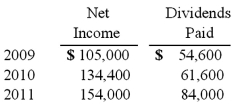On January 1, 2009, Vacker Co. acquired 70% of Carper Inc. by paying $650,000. This included a $20,000 control premium. Carper reported common stock on that date of $420,000 with retained earnings of $252,000. A building was undervalued in the company's financial records by $28,000. This building had a ten-year remaining life. Copyrights of $80,000 were to be recognized and amortized over 20 years.
Carper earned income and paid cash dividends as follows:
On December 31, 2011, Vacker owed $30,800 to Carper. There have been no changes in Carper's common stock account since the acquisition.
Required:
If the equity method had been applied by Vacker for this acquisition, what were the consolidation entries needed as of December 31, 2011?
Definitions:
Reinforcement
In behavioral psychology, it refers to any stimulus which strengthens or increases the probability of a specific response.
Positive Reinforcer
A stimulus that, when presented after a behavior, increases the likelihood of that behavior being repeated.
Negative Reinforcer
A stimulus whose removal or avoidance after a response strengthens that response or makes it more likely to happen again.
Conditioned Stimulus
A previously neutral stimulus that, after becoming associated with an unconditioned stimulus, evokes a conditioned response in classical conditioning.
Q40: Perry Company acquires 100% of the stock
Q42: Which of the following statements is true
Q50: The main practical problem associated with building
Q51: Presented below are the financial balances for
Q55: Bullen Inc. acquired 100% of the voting
Q55: What would differ between a statement of
Q57: On January 1, 2011, Jackie Corp. purchased
Q62: Given that our galaxy has a volume
Q97: On January 1, 2010, Jannison Inc. acquired
Q120: Watkins, Inc. acquires all of the outstanding